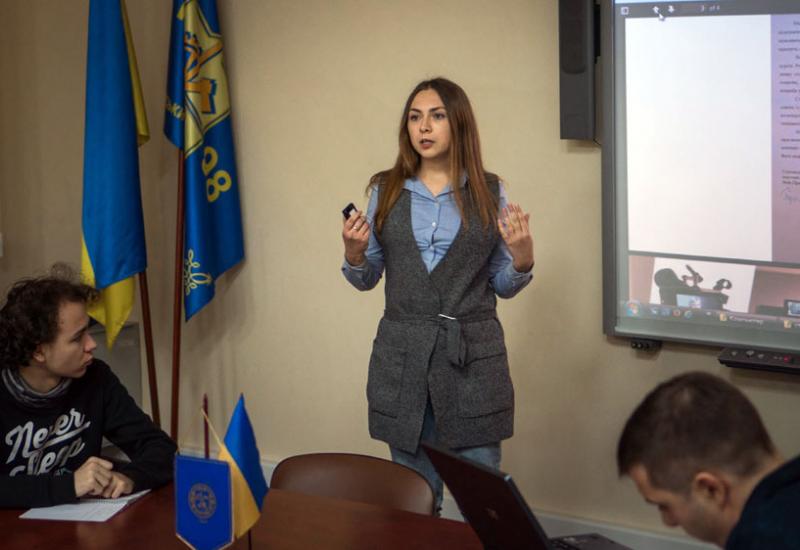Among the public projects that were proposed by the teachers and students of our university and became the winners of the contest of the Kyiv city state administration "Public Budget 2017", there is a project to create a studio for the production of massive open online courses "Belka MOOC" at NTB of the KPI proposed by the student of the 5th year of FBT Elizaveta Ilyusenko, co-founder of Belka's free space Valentyn Chetverikov and a team of teachers, students and post-graduate students.
Mass open online courses are online courses that are designed for all interested users who have access to the Internet regardless of age, nationality or country of use. They contain video collections, notes, presentations, and tests. The term Massive Open Online Course (MEP) was first proposed by Dave Kormier in 2008, and the 2012 New York Times became the year of massive open online courses. Then, in 2012, the world's top three modern online education platforms began to work simultaneously: Coursera (founded by Stanford University teachers), Udacity (founded by Stanford University teachers, developed thanks to the lecture courses of the Georgia Institute of Technology) and edX (a common project of Harvard University and the Massachusetts Institute of Technology).
There are more than 7,000 open online courses in the world today, there are many platforms offering access to courses, and in order to choose them correctly, there are aggregators of courses, where you can find the courses you need and get acquainted with the reviews from their listeners upon taping the keywords.
In Ukraine, the first attempt to create massive open online courses was made in 2013 on the basis of the Taras Shevchenko National University of Kyiv, where the "University online" was opened. However, the project didn't become popular. In the spring of 2014 EdEra project was launched in the form of online courses, created for helping students to prepare for external independent evaluation. And the first successful platform of open online courses in Ukraine is the Prometheus platform - was founded in October 2014 by Ivan Prymachenko and Oleksyi Molchanovskyi. Now there are 65 courses on the platform. All of them are taught in Ukrainian language and most of them are developed by leading Ukrainian teachers. Today, Prometheus has more than 425 thousand active users, their number is constantly increasing. By the way, the mobile app for Android and iOS has recently appeared on the platform. In addition, in order to assist teachers in developing online courses, in 2016 Prometheus introduced the course "How to create a massive open online course".
An access to open online courses enables the development of mixed learning, which involves a combination of commonly used teaching practices (lectures, classroom practical classes, workshops, workshops, etc.) with a digital component - information technology for reviewing lecture material, homework, process automation testing, etc. Modern technologies allow the transfer of lecture material online through the creation of video lections and their placing on the appropriate platform. Audience classes turn into problem-oriented lectures, during which the teacher can explain incomprehensible places on the online material and in more complex examples give additional material and discuss it with the students. It motivates students to study independently and critically, allows them to read up on the learning material, optimizes the teaching time. Part of the practical classes or their full cycle can also be transferred online and fully automated.
In 2016, the platform of Prometheus (MOOC) together with an initiative group of students, lecturers and postgraduates of the KPI, Ukrainian Catholic University, Ivan Franko National University of Lviv, National University "Lviv Polytechnic" has developed a pilot project for the introduction of mixed learning into the higher education system of Ukraine and presented it at a meeting of the expanded Methodological Council of our University in June 2016. In the 2016/2017 academic year, a pilot project simultaneously worked in these four universities. All of them have introduced the best course on the basics of programming CS50 from Harvard University specialists. In April 2016, this course was translated into Ukrainian, which allowed it to be adapted for teaching at Ukrainian universities. Last year the course was tested on FIOT, PBF, and FEL.
In 2016-2017 the KPI was actively creating their own online courses. A philosophy course from V.D. Pikhorovych appeared a course on digital literacy enhancement "Digital communications in the global space" by the team of lecturers, postgraduates and students of Igor Sikorsky Kyiv Polytechnic Institute; our lecturers took part in the creation of training courses for foreign language lessons in the Ukrainian language and literature and mathematics.
To create new massive open online courses, we need high-quality equipment and a team that would help teachers not only to film the material but also to develop an online course - from the planning to the implementation. With a view to this, it is planned to create a studio for the production of open online courses "Belka MOOC", which will be located on the premises of the Scientific and Technical Library of G.I. Denysenko of our university.
The project team aims to create a technical and methodological opportunity for all those who want to develop online courses, especially for university lecturers, first of all for the KPI lecturers.
For realization of the project the budget of Kiev in 2018 will allocate 2 million USD. As early as January 2018 it is planned to start purchasing equipment - cameras, computers for video installation and graphic design of any complexity, audio equipment, professional lighting for the studio, etc.
Creating a massive open online course is a difficult thing. It requires a lot of author's efforts, in particular, the thorough work on the methodical component. The BelkaMOOS team will provide training for those wishing to join the project, master classes for teachers who want to develop their own online courses, provide them with support online and offline, and involve all those who are not indifferent about improving education in Ukraine.

